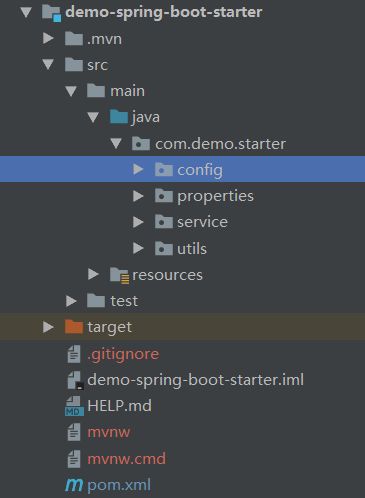springboot自定义starter
原文地址:https://www.cnblogs.com/hello-shf/p/10864977.html
目录
- 一、码前必备知识
- 二、starter的实现方法
- 1、新建一个工程
- 2、pom依赖
- 3、定义一个实体类映射配置信息
- 4、定义一个Service
- 5,定义一个配置类
- 6、最重要的来了
- 7、测试
返回目录
一、码前必备知识
1、SpringBoot starter机制
SpringBoot中的starter是一种非常重要的机制,能够抛弃以前繁杂的配置,将其统一集成进starter,应用者只需要在maven中引入starter依赖,SpringBoot就能自动扫描到要加载的信息并启动相应的默认配置。starter让我们摆脱了各种依赖库的处理,需要配置各种信息的困扰。SpringBoot会自动通过classpath路径下的类发现需要的Bean,并注册进IOC容器。SpringBoot提供了针对日常企业应用研发各种场景的spring-boot-starter依赖模块。所有这些依赖模块都遵循着约定成俗的默认配置,并允许我们调整这些配置,即遵循“约定大于配置”的理念。
2、为什么要自定义starter
在我们的日常开发工作中,经常会有一些独立于业务之外的配置模块,我们经常将其放到一个特定的包下,然后如果另一个工程需要复用这块功能的时候,需要将代码硬拷贝到另一个工程,重新集成一遍,麻烦至极。如果我们将这些可独立于业务代码之外的功配置模块封装成一个个starter,复用的时候只需要将其在pom中引用依赖即可,SpringBoot为我们完成自动装配,简直不要太爽。
3、自定义starter的案例
以下案例由笔者工作中遇到的部分场景
▲ 动态数据源。
▲ 登录模块。
▲ 基于AOP技术实现日志切面。
。。。。。。
4、自定义starter的命名规则
SpringBoot提供的starter以spring-boot-starter-xxx的方式命名的。官方建议自定义的starter使用xxx-spring-boot-starter命名规则。以区分SpringBoot生态提供的starter。
5、代码地址
https://github.com/hello-shf/demo-spring-boot-starter.git simple分支哦
返回目录
二、starter的实现方法
返回目录
1、新建一个工程
命名为demo-spring-boot-starter
下图为工程目录结构
返回目录
2、pom依赖
![]()
1 24 4.0.0 56 10org.springframework.boot 7spring-boot-starter-parent 82.1.4.RELEASE 9com.demo 11demo-spring-boot-starter 120.0.1-RELEASE 13demo-spring-boot-starter 14Demo project for Spring Boot 15 1617 19 201.8 1821 22 3323 27 28org.springframework.boot 24spring-boot-configuration-processor 25true 2629 32org.springframework.boot 30spring-boot-starter 31
![]()
返回目录
3、定义一个实体类映射配置信息
@ConfigurationProperties(prefix = "demo") 它可以把相同前缀的配置信息通过配置项名称映射成实体类,比如我们这里指定 prefix = "demo" 这样,我们就能将以demo为前缀的配置项拿到了。 ps:其实这个注解很强大,它不但能映射成String或基本类型的变量。还可以映射为List,Map等数据结构。
![]()
1 package com.demo.starter.properties;
2
3 import org.springframework.boot.context.properties.ConfigurationProperties;
4
5 /**
6 * 描述:配置信息 实体
7 *
8 * @Author shf
9 * @Date 2019/5/7 22:08
10 * @Version V1.0
11 **/
12 @ConfigurationProperties(prefix = "demo")
13 public class DemoProperties {
14 private String sayWhat;
15 private String toWho;
16
17 public String getSayWhat() {
18 return sayWhat;
19 }
20
21 public void setSayWhat(String sayWhat) {
22 this.sayWhat = sayWhat;
23 }
24
25 public String getToWho() {
26 return toWho;
27 }
28
29 public void setToWho(String toWho) {
30 this.toWho = toWho;
31 }
32 }
![]()
返回目录
4、定义一个Service
![]()
1 package com.demo.starter.service;
2
3 /**
4 * 描述:随便定义一个Service
5 *
6 * @Author shf
7 * @Date 2019/5/7 21:59
8 * @Version V1.0
9 **/
10 public class DemoService {
11 public String sayWhat;
12 public String toWho;
13 public DemoService(String sayWhat, String toWho){
14 this.sayWhat = sayWhat;
15 this.toWho = toWho;
16 }
17 public String say(){
18 return this.sayWhat + "! " + toWho;
19 }
20 }
![]()
返回目录
5,定义一个配置类
这里,我们将DemoService类定义为一个Bean,交给Ioc容器。
▲ @Configuration 注解就不多说了。
▲ @EnableConfigurationProperties 注解。该注解是用来开启对3步骤中 @ConfigurationProperties 注解配置Bean的支持。也就是@EnableConfigurationProperties注解告诉Spring Boot 能支持@ConfigurationProperties。
当然了,也可以在 @ConfigurationProperties 注解的类上添加 @Configuration 或者 @Component 注解
▲ @ConditionalOnProperty 注解控制 @Configuration 是否生效。简单来说也就是我们可以通过在yml配置文件中控制 @Configuration 注解的配置类是否生效。
![]()
1 package com.demo.starter.config;
2
3 import com.demo.starter.properties.DemoProperties;
4 import com.demo.starter.service.DemoService;
5 import org.springframework.beans.factory.annotation.Autowired;
6 import org.springframework.boot.autoconfigure.condition.ConditionalOnProperty;
7 import org.springframework.boot.context.properties.EnableConfigurationProperties;
8 import org.springframework.context.annotation.Bean;
9 import org.springframework.context.annotation.Configuration;
10
11 /**
12 * 描述:配置类
13 *
14 * @Author shf
15 * @Date 2019/5/7 21:50
16 * @Version V1.0
17 **/
18 @Configuration
19 @EnableConfigurationProperties(DemoProperties.class)
20 @ConditionalOnProperty(
21 prefix = "demo",
22 name = "isopen",
23 havingValue = "true"
24 )
25 public class DemoConfig {
26 @Autowired
27 private DemoProperties demoProperties;
28
29 @Bean(name = "demo")
30 public DemoService demoService(){
31 return new DemoService(demoProperties.getSayWhat(), demoProperties.getToWho());
32 }
33 }
![]()
返回目录
6、最重要的来了
如图,新建META-INF文件夹,然后创建spring.factories文件,
在该文件中加入如下配置,该配置指定上步骤中定义的配置类为自动装配的配置。(笔者努力最近把自动装配的博客写出来)
1 #-------starter自动装配--------- 2 org.springframework.boot.autoconfigure.EnableAutoConfiguration=com.demo.starter.config.DemoConfig
返回目录
7、测试
在demo-spring-boot-starter工程中执行mvn clean install 一个自定义的starter新鲜出炉。
新建测试工程
引入starter依赖
12 com.demo 3demo-spring-boot-starter 40.0.1-RELEASE 5
配置文件
1 demo.isopen=true 2 demo.say-what=hello 3 demo.to-who=shf
然后写个测试类。
![]()
1 package com.example.test.controller;
2
3 import com.demo.starter.service.DemoService;
4 import org.springframework.web.bind.annotation.GetMapping;
5 import org.springframework.web.bind.annotation.RestController;
6
7 import javax.annotation.Resource;
8
9 /**
10 * 描述:
11 *
12 * @Author shf
13 * @Description TODO
14 * @Date 2019/5/13 15:52
15 * @Version V1.0
16 **/
17 @RestController
18 public class DemoController {
19 @Resource(name = "demo")
20 private DemoService demoService;
21
22 @GetMapping("/say")
23 public String sayWhat(){
24 return demoService.say();
25 }
26
27 }
![]()
浏览器


